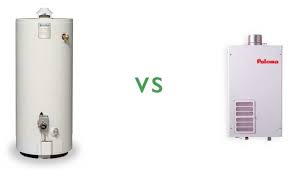There are 2 main kinds of water heaters available in the market- Tank water heater or water heater without a tank. Today, we will discuss the main difference between the tank water heater and the tankless water heater.
What are Tank Water Heaters?
Generally, houses have tank water heaters which are otherwise known as water heaters with storage. As the name suggests, these water heaters come with a tank that can hold 20 to 120 gallons of water with gas burners or heating elements. At the top, the tank water heaters have hot water and at the bottom, these water heaters have incoming cold water.
This feature is given so that you get hot water consistently. Tank water heaters tend to lose heat via the walls of the tank. The tank comes with insulation, however, the temperature difference across this wall with insulation is huge. Thus, even with the large insulation, the heater tends to lose heat considerably.
What is a Tankless Water Heater?
Tanklesstankless water heater, when it comes to tankless water heaters then there is no considerable heat loss because in it the water is heated when there is a requirement for hot water. In a tankless water heater, there is no water filled in it for standby. The system in the heater comes in two types whole house heaters and point-of-use heaters. Point-of-use heaters are put in one particular faucet and it supplies hot water to just one fixture.
Tankless water heaters are energy-saving and supply hot water constantly.
In standby, the water tends to lose its heat and to address this issue, tankless water heaters come into play. These types of heaters are generally installed in the place where you need the water heater like in the bathroom. One of the great features of a tankless water heater is that you will consistently have hot water and you will not run out of it considering that there is enough water heater to satisfy the demand for hot water. Additionally, they don’t have the loss of standby hot water. This is because no hot water is there to store in the tank thus no loss of heat is there when the heater isn’t running.
- The Heating Elements:
One of the main advantages of tank water heaters is that their heating elements are quite small. This is because a defined volume of water is stored in the tank and as it remains arranged as the hot water is used, an efficiently sized tank heater can cater to the hot water demand of the family without the need for electricity or gas to heat the water.
On the other hand, tankless water heaters generally have large-sized burners as compared to tank water heaters. A normal whole-house tankless heater that allows a family to use two showers simultaneously will have the burner generating 180,000Btu/hour. The biggest tankless water heaters come with burners with more than 300,000Btu/hour. If you want this much natural gas you need a burner with a greater gas supply.
The tankless water heaters with a substantial gas line need huge combustion of air. Whereas, a small tank of 125,000Btu/hour variant that is working at its maximum capacity needs around 30 cm of air to complete the combustion. At the same time, a 180,000 Btu per hour variant needs up to 45 cfm of air working at its maximum capacity.
- The Flow Rates
A tankless water heater has a flow rate of 0.5 or 0.6 GPM. This means that at flow rates lesser than this the water would not come. This is a big problem for people with bathroom faucets.
- Cost
A tankless water heater can cost double that tank water heater. The price entirely depends on the model and size that you choose. If you are going for a point-of-use tankless heater, then you would have to buy additional units. A normal tank water heater providing two showers simultaneously can come with a price tag of $700.00. The normal tank water heater comes across $220, on the other hand, a single tankless heater comes with a price tag of 980.
While the tankless water heater seems costly right now, it would help in saving a significant amount of money over the year.
